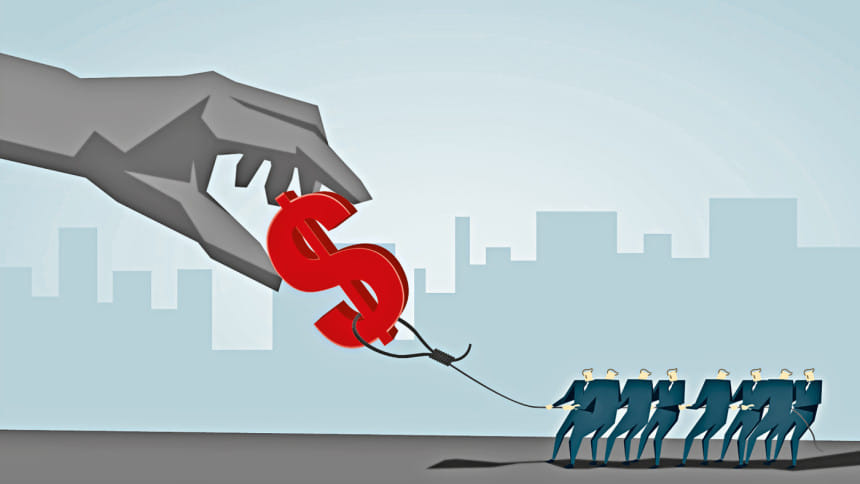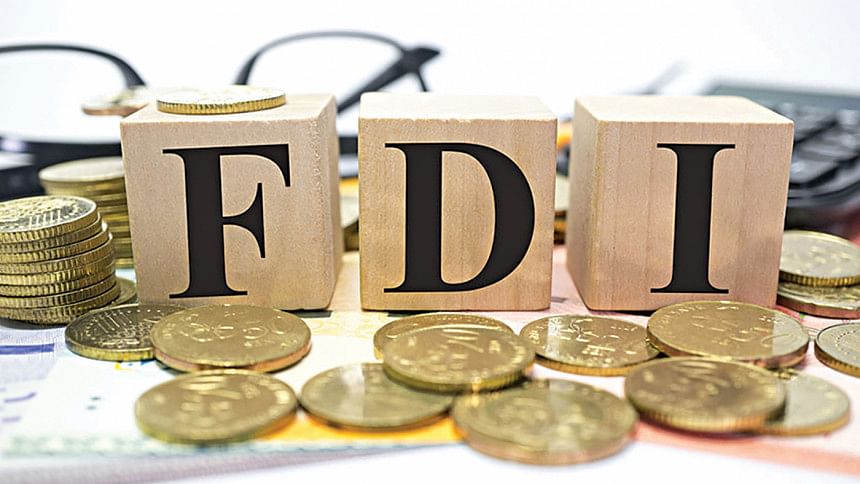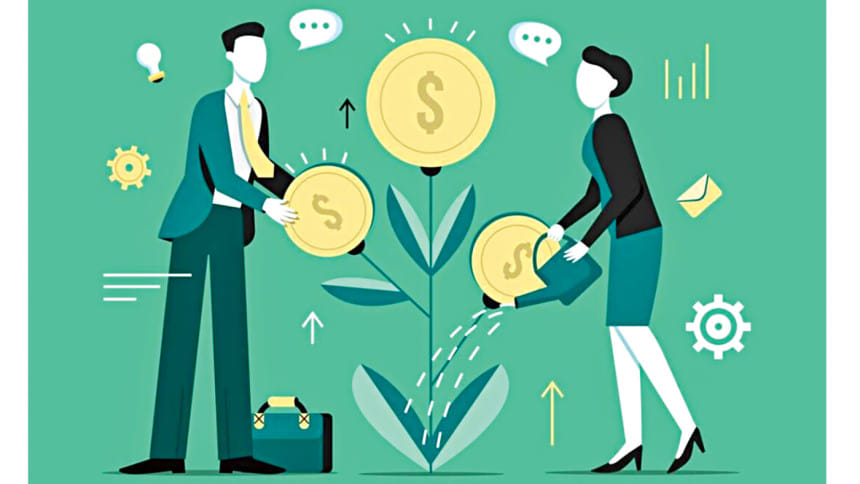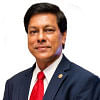Sustaining our economic growth for a better society

While most economies around the world today are suffering from an economic crisis due to the Covid-19 pandemic, Bangladesh's gross domestic product (GDP) is expected to grow by 6.4 percent in the 2021-22 fiscal year (FY), according to the World Bank. Prior to the outbreak, the economy was growing rapidly, recording an annual expansion in the range of 8 percent. A large part of this growth is being driven by export earnings, especially from the ready-made garments (RMG) industry, remittances sent by migrant workers, and growth in the agricultural sector. Today, Bangladesh has grown into the 41st largest economy (by GDP) in the world and the second-largest in South Asia. It is projected to be the 25th largest by 2035.
The role of domestic and foreign direct investment
The Bangladesh government wants to achieve the status of the Upper Middle-Income Country (UMIC) by 2030 and the status of the High-Income Country (HIC) by 2041. Research suggests that to transform Bangladesh into a high-income country, Bangladesh would need to raise its Investment-GDP ratio between the range of 40-44 percent of GDP. Currently the investment to GDP ratio in Bangladesh is hovering around 30 percent. Experts say achieving the status of an advanced economy by 2041 is possible, but for that the country will need massive domestic and foreign investment in infrastructure development, health and education, etc. Unfortunately, while public investment has increased to some extent, private investment has been stagnating at around 22-23 percent of GDP. We are also lagging behind in attracting foreign direct investment (FDI). The rate of FDI inflow in Bangladesh is only around 1 percent of GDP, one of the lowest in Asia.
The low inflow of FDI in Bangladesh indicates that we have failed to gain investors' confidence. Although Bangladesh advanced eight notches in the World Bank's ease of doing business 2020 ranking to 168 out of 190 countries, there are still significant bottlenecks in doing business. Industry experts say, the deterrents that discourage foreign investors include time-consuming bureaucracy, poor socio-economic and physical infrastructure, unreliable energy supply, corruption, absence of good governance, low labour productivity, undeveloped money and capital markets, complicated tax system, frequent changes in policies on import duties for raw materials, machinery and equipment, delays in decision-making, etc.
At present, more than 68 percent of our population is of working age, between 15 and 64 and every year around 2 million people are adding up to our existing workforce. Furthermore, it is reported that a significant number of migrant workers who have been contributing to the country's economic development while also providing better lives for themselves and their families have been sent back to Bangladesh due to Covid-19. Therefore, to create jobs on a large scale to absorb a growing labour force, including the migrant workers, the government should immediately remove the impediments that are responsible for the high cost of investment.
Inclusive and equitable quality education
While Bangladesh has made remarkable progress in expanding primary and secondary education, especially in terms of enrolment and gender parity, there are serious concerns surrounding the quality of education. Also, there is a gap between the education provided in cities and the education provided in rural areas and as a result, in rural areas many parents are reluctant to send their children to schools because they consider education to be non-beneficial as neither the textbooks nor the curriculum is relevant to their life situation, while hours spent at workplace generate income and support the family.

At present, the primary and secondary educational system is a victim of a corrupt mindset that is devoting all its energy on securing higher pass rates through an apparent policy of easy marking, while showing less concern with the actual learning outcomes. At the tertiary level, we have failed miserably. No Bangladeshi university found a proper place in the QS World University Ranking 2022—Dhaka University and Buet were placed in the 801-1000 range, while our best private universities ranked even lower.
The discomforting consequence of this is evident when we find that a substantial chunk of skilled jobs in our industries and other economic enterprises are occupied by professionals from neighbouring countries.
Nutrition, health and economic growth
The interconnections between population health and the economy are well known. Although Bangladesh has made some improvements in many health indicators in the last few decades, still with one in every seven persons suffering from undernourishment, according to the 2019 Global Hunger Index (GHI). In another report prepared by the UN Food and Agriculture Organization (FAO), between 2018 and 2020, the number of people without food security in Bangladesh increased by 2.4 percent to a whopping 52 million
The nutrition problem is compounded by issues related to healthcare facilities. The pandemic has exposed the cracks in our health system, we have seen how inadequate and incapacitated our health facilities are. Bangladesh's investment in health is one of the world's lowest (less than one percent of GDP). There is a severe shortage of physicians, medical technologists, nurses and clinical equipment. Currently, there is one registered physician per 1,847 people, and one government physician per 6,579 people, according to the Bangladesh Medical and Dental Council (BMDC). Patients, especially the poor and disadvantaged, end up seeking healthcare from non-qualified providers in the informal sector. Every year, a large number of people—including politicians, businessmen and even ordinary people—go abroad for medical treatment due to a lack of confidence in our healthcare system. The Bangladesh Investment Development Authority (BIDA), using data from Health Bulletin, estimates that Bangladeshis spend around USD 2.04 billion annually on healthcare abroad.

Income and wealth inequality growing
Rising income and wealth inequality not only undermines the sustainability of growth, it also raises the threat of social and political unrest. According to the World Inequality Report 2022, only one percent of Bangladesh's population held 16.3 percent of national income in 2021, and the bottom half held 17.1 percent. Research suggests that the number of ultra-wealthy people in Bangladesh increased faster than in any other country in the world between 2010 and 2019. Bangladesh was ranked first among the top 10 fastest growing wealth markets in the world during the period, where wealthy people with more than USD 5 million in net worth increased by 14.3 percent a year on average.
Studies show that primary factors that deprive poor and vulnerable people of their most elementary rights and may lead to greater income inequality in Bangladesh include unequal access to education and employment opportunities, exploitation at workplace, low-wage jobs with scant benefits, high rates of youth unemployment, poor healthcare, corruption and lack of access to formal financial services such as credit, savings and insurance that higher income groups may take for granted.
Therefore, for each and every citizen of Bangladesh to live in peace, security, and prosperity, we need to have policies in place that ensure "inclusive growth"—that is the share of economic benefits from growth must reach all citizens. Priority should be given on issues of social protection, good governance and policies of redistribution of wealth—moving money from those with too much of it to those with too little, through the tax and benefit system (i.e. by taxing the upper-income groups at higher rates) and spending the revenue in sectors and areas such as free/subsidised healthcare and education/skill development scheme for lower-income groups, so that they can get access to jobs that are more productive and rewarding, which, in turn, will help to achieve the highest sustainable economic growth and development.
Strengthening the financial sector
Finance is a vital ingredient of economic growth. In Bangladesh, banks remain the main source of financing for companies and it has been playing an important role in our socioeconomic development. But in recent years, this crucial sector has been facing many challenges, which include among others, a big volume of non-performing loans (NPLs), lack of corporate governance, increasing capital shortfall and slow loan recovery that have raised serious concerns about the efficiency and soundness of this sector. It is an open secret now that the country's banking sector has been mired in a series of scams and irregularities, such as the funnelling of loans worth billions of Taka by violating banking rules and procedures to influential people, who have been known to be lax with repayments. As a result, as of September 2021, defaulted loans in the banking sector stood at a record Tk 1 trillion. Unfortunately, while the banking sector is passing through such a financially difficult period, government's borrowing from the banking system continues to rise.

Data shows between July 1 and December 14, 2021, the government took loans to the tune of Tk 22,344 crore from banks and it has set a bank borrowing target of Tk 76,452 crore for the current fiscal year.
The rise in defaulted loans and government's borrowing from the banking system is another reason behind the declining private-sector credit growth and investment. To boost up private sector investments and for the sustainable economic growth, the country needs more sources of finance and more sources of credit.
Corruption and good governance
Unpleasant as it may sound, corruption has spread over the whole society and its roots lie deep in bureaucratic, business and political institutions. Bangladesh ranks 12th among the most corrupt countries in the world, according to the 'Corruption Perceptions Index (CPI) 2020'. Bribery, rent-seeking and inappropriate use of government funds, illegal tender manipulation, land, river and wetland grabbing are widely prevalent in every sphere of life in today's Bangladesh. A recent study conducted by the World Bank found various corruption and discrepancies in the Bangladesh government's public procurement process. About 31 percent of the surveyed bidders said they had offered gifts of more than USD 300 to procuring entity officials or others to tilt procurement decisions in their favour. Some 62 percent of bidders admitted to having given gifts worth above Tk 25,000 and 17 percent gave gifts below that amount to sway public officials. Moreover, 17 percent paid for dinners for government officials and 4 percent invited officials to trips, the study said. Simply put, corruption becomes a way of life and it costs the country at least 2-3 percent of GDP.
Illicit outflows of financial resources are another key development challenge. According to Global Financial Institute (GFI)—a Washington-based think tank—USD 61.6 billion was siphoned out of Bangladesh between 2005 and 2014. In 2015 alone, about USD 5.9 billion was laundered out of the country. The GFI reveals that on an average, USD 7.53 billion is laundered each year and accordingly from 2016 to 2020, around USD 37.65 billion has been laundered.
Corruption, bribery, and money laundering are the biggest obstacles to Bangladesh's economic and social development; it is stealing the opportunities of ordinary people to progress and to prosper.
Concluding thoughts
In addition to the issues discussed above, there are many other factors like access to credit and financial services, narrow export basket, unplanned urbanisation, pollution, climate change, low tax-GDP ratio, low rate of female labour force participation, etc, that are also affecting our efficiency and productivity, as well as constraining businesses and industries that have the potential to grow. It should also be noted that Bangladesh is set to graduate from least developed (LDC) countries by 2026, and after graduation, the country will no longer enjoy certain preferences and privileges. For instance, international trade will be more competitive, we will no longer enjoy duty-free and quota-free access to countries in the European Union. Rules regarding trade-related intellectual property rights may also be tightened by importers of goods from Bangladesh.
There is no denying the fact that following our exit from the LDC category in 2026, sustaining the current high economic growth will be an uphill challenge. Therefore, now is the time to change and resolve the above issues in a sustainable manner and plan for more suitable economic, social, and environmental policies to remain competitive and keep the economic growth rate steady along with securing peace and justice for all Bangladeshis.
Abu Afsarul Haider is an entrepreneur.

 For all latest news, follow The Daily Star's Google News channel.
For all latest news, follow The Daily Star's Google News channel. 



Comments